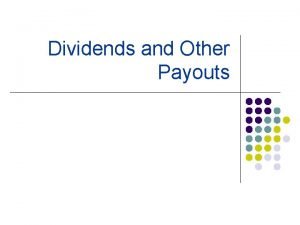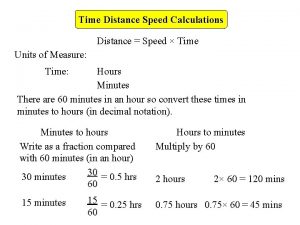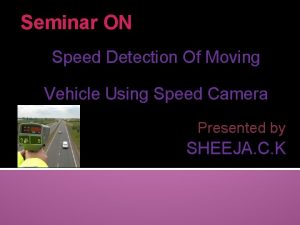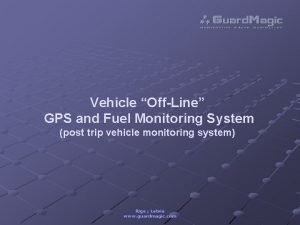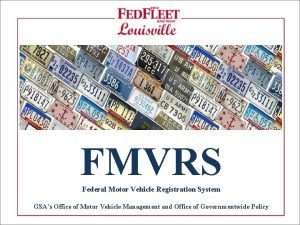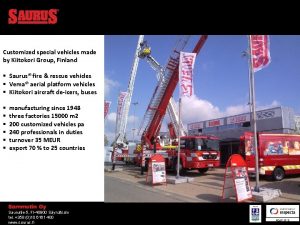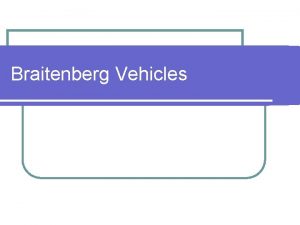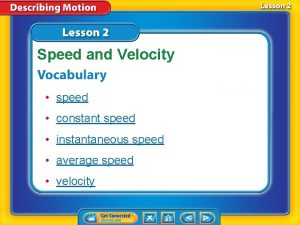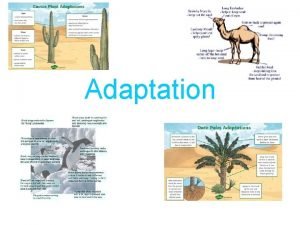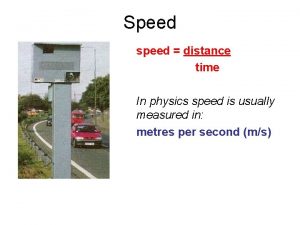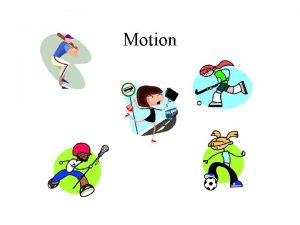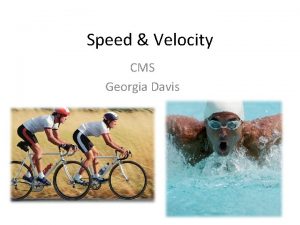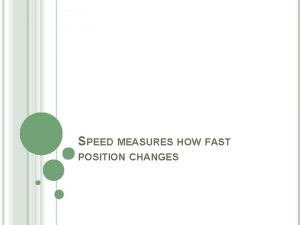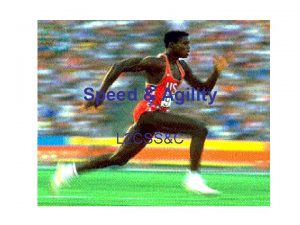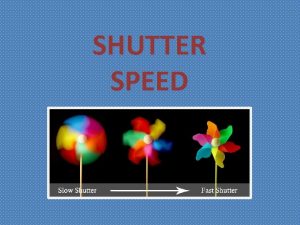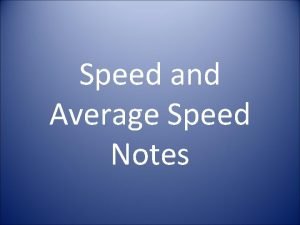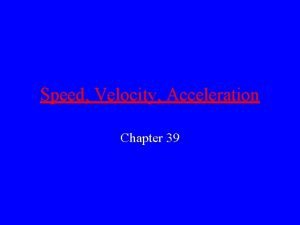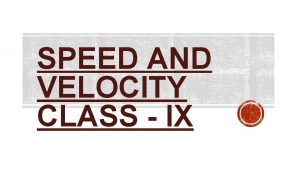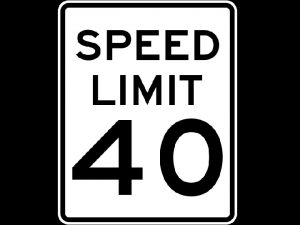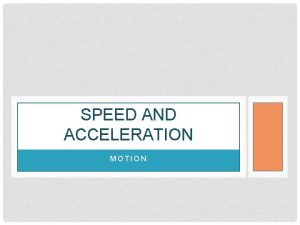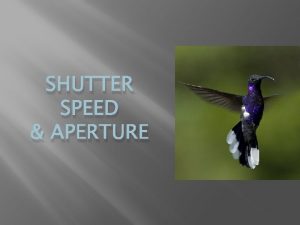Review 0 Intelligent Speed Adaptation in vehicles Date


















- Slides: 18

Review - 0 Intelligent Speed Adaptation in vehicles Date: 01/08/09 Tamil Eniyan. M 08 MEA 026 M. Tech-Automotive Electronics

Contents • Introduction – Existing speed adaptation techniques – Need • System Overview – Block diagram – Steps • Time plan • Software tools • Hardware modules • Conclusion

Introduction • The Intelligent Speed Adaptation is done in vehicle using GPS technology by tracking the location of the vehicle • This system does not require a preloaded map or route for its operation • This system is a low cost and effective system which requires less memory and simple algorithm.

Existing speed adaptation techniques • RF id based systems – This system uses RF id tags on the sign boards, the receiver module in the vehicle receives the signal at various speed zones through these RF tags. • This systems can be employed only for slow vehicles. Practically it cannot be employed in the highway for vehicles with high speed like 100 kmph • Optical recognition systems – This is done by camera based detection, the camera records continuously, when a sign boar is approached, the sign is recognized by image processing techniques. • This system uses complex algorithm • Uses much resources • Some critical cases when the sign board is covered by tree branches, the system does not detect the sign board.

Existing speed adaptation techniques • GPS based systems – The GPS receiver module tracks its position and using the pre loaded map and speed zone database, the speed adaptation is done • Requires a large memory to store the complete map and speed zone databases. • Emergency sign boards like “MEN AT WORK”, “TAKE DIVERSION” etc. are not fed to the receiver dynamically. • Dead reckoning – Using sensors, it can plot the path taken by the vehicle. By overlaying this path onto a digital map, the DR system knows approximately where the vehicle is, what the local speed limit etc. • This system is much complicated with multiple sensors and possibility of deviation from actual data is high

Need for a new system • To over come the limitations of the other Speed adaptation systems. • To reduce the memory requirement of conventional GPS speed adaptation techniques. • To reduce the system cost and enhance the system performance to provide dynamic update of information.

Block Diagram 4 lat=12. 970649 lon=79. 159310 Speed controller 3 GPS Receiver My position? RF Tx TOLLGATE 1 RF Receiver 2 Controller Display & Alert Memory

Step 1 Transmitter sends a data to the vehicle. The data is a table of information of latitude and longitude and its corresponding road sign, speed limit. .

Step 2 GPS receiver requests its position data to satellite.

Step 3 GPS receiver receives its position data from satellite. lat=12. 970649 long=79. 159310

0001|76. 11004|12. 19256 A sample data from received data. Step 4 The current position is compared with the data of table received. =? lat=12. 970649 long=79. 159310 Current Position YES Check for the corresponding sign & speed limit When the current position reaches the position of data, corresponding alert is done. Alert the driver / Limit speed From GPS


Time plan August September October November December Literature survey Selection of components/ Study about components selected (microcontroller, GPS, Speed control) Basic hardware design Full Hardware Implementation (Speed Zone Detection & Alert) January February Programming March April Project Completion Stage II development (speed control implementation) Report Preparation

Software Tools • Microcontroller Programming tools – Keil IDE – MPLAB IDE • Flashing tool

Hardware modules • GPS Receiver • Microcontrollers • Wireless Transmitter / Receiver • Computer Interface • Display unit • Speed Control Module

Reference • N. Agerholm, R, Waagepetersen, N. Tradisauskas, and H. Lahrmann 2008 - IEEE Intelligent Vehicles Symposium “Intelligent Speed Adaptation in Company Vehicles” • Riaz Sayed, Pierre Delaigue, Jeremy Blum, Ali Mortazavi and Azim Eskandarian 2007 -01 -1321 SAE TECHNICAL PAPER SERIES “Development of an Intelligent Multimode Speed Adaptation System” • European Road Safety Observatory “Intelligent Speed Adaptation (ISA)” http: //www. erso. eu/knowledge/content/04_esave/ • University of Leeds and MIRA Ltd. “Intelligent Speed Adaptation Literature Review and scoping study”- January 2006 http: //www. tfl. gov. uk/assets/

Thank you

 Intelligent speed adaptation
Intelligent speed adaptation Record date for dividend
Record date for dividend Dividend eligibility
Dividend eligibility Distance formula speed time
Distance formula speed time Passengers can help a driver manage emotions by
Passengers can help a driver manage emotions by Speed detection of moving vehicle using speed cameras ppt
Speed detection of moving vehicle using speed cameras ppt Unreal engine 4 vehicle
Unreal engine 4 vehicle Vehicle fuel monitoring system
Vehicle fuel monitoring system Disadvantages of monophasic liquid dosage form
Disadvantages of monophasic liquid dosage form Momentum and impulse poem
Momentum and impulse poem Trade-oriented sales promotion
Trade-oriented sales promotion Fuel pressure regulator diagram
Fuel pressure regulator diagram Gsa fmvrs
Gsa fmvrs Kiitokori special vehicles
Kiitokori special vehicles Plugins and delivery vehicles in multimedia
Plugins and delivery vehicles in multimedia Braitenberg vehicles
Braitenberg vehicles Semi solid vehicles
Semi solid vehicles All obd ii vehicles use what type of read-only memory?
All obd ii vehicles use what type of read-only memory? Gso technical regulations
Gso technical regulations


